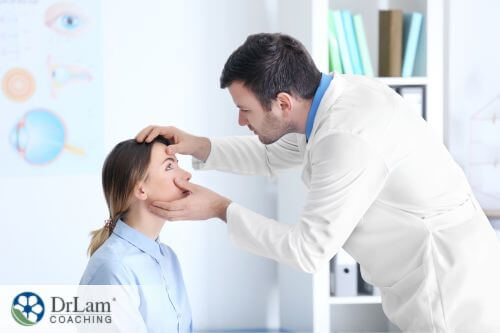 Do you experience dry, irritating, scratchy eyes, especially at the end of a long day? This may not just be tiredness; it could be a condition known as dry eye syndrome.
Do you experience dry, irritating, scratchy eyes, especially at the end of a long day? This may not just be tiredness; it could be a condition known as dry eye syndrome.
This issue can vary from mild to severe and cause a range of symptoms. But what is common among everyone with this problem is the need to get help. If you just ignore your symptoms, or hope that they go away, then it could lead to lifelong problems and even disability.
Here’s what you need to know about this issue and what you should do instead of ignoring it.
Dry eye syndrome is also known as keratitis sicca, and it’s an ongoing or recurrent sensation of having dry eyes. The severity of this issue can vary from quite mild to very severe, and it’s often worse at the end of the day and better at the beginning.
Basically, this condition develops when the eyes don’t produce enough tears or the right quality of tears. Tears act as a protective coating on the eyes, washing away dirt, providing nutrients, preventing infection, and keeping the eyes moist. They’re made of mucus, oil, and water, and need to be in the right balance for good eye health. When this balance is lost, you can develop dry eyes.
This condition can severely impact your quality of life. When the symptoms are severe, you may have trouble keeping your eyes open, driving, or working. And even when the symptoms are mild, it’s often very irritating and frustrating.
If your condition is mild, then there shouldn’t be any long-term effects from this issue. However, if you don’t seek out help or if your condition becomes severe, it can cause:
When you have dry eye syndrome, you may experience these symptoms all the time or they may come and go. They’re often worsened by stress or being tired and are usually better in the morning, just after you wake.
The most common symptoms of this condition are:
There are a range of issues that can lead to a lack of tears or bad tear quality, resulting in dry eye syndrome. These include:
As you get older, tear production decreases and can result in dry eyes.
Some eye conditions can also cause dry eyes as well as other symptoms. Some eye conditions that may be relevant to this syndrome are:
Some medications that can cause dry eyes are:
 Antidepressants
AntidepressantsCertain environmental conditions can cause dry eyes in some people. Conditions that may bring on this problem are:
People are supposed to blink about once every 12 seconds. When you blink, it helps to cover your eyes with tears. So, if you don’t blink enough, then your eyes can dry out. Some things that may result in you not blinking enough are playing video games, watching TV, or playing on your phone for a long time.
There are also physical conditions and issues that can interfere with the blink reflex such as:
Certain procedures to correct your vision may cause or worsen dry eyes. This includes LASIK and other refractive surgeries.
Some autoimmune diseases can affect the tear glands and cause dry eyes, such as:
People with adrenal fatigue often experience a range of symptoms from weight gain to fatigue, brain fog, and memory issues. However, you may not realize that your dry eye syndrome could be linked to this condition as well.
Adrenal fatigue occurs when you experience a period of chronic, ongoing stress. Under stress, your adrenal glands release cortisol, which is meant to give you energy and change how different parts of your body function so that you can survive the cause of the stress. Unfortunately, this is less than helpful when the stress is chronic.
If you were facing a tiger, then high cortisol levels would help you run away and cut down on any damage you suffered. But when stress is chronic, then your cortisol levels have to remain higher than normal over a long period of time. This can cause the adrenal glands to become fatigued, sometimes resulting in Adrenal Fatigue Syndrome (AFS). AFS is the non-Addison's form of adrenal dysfunction, where the body's stress response cannot keep up with life's chronic stressors. The high cortisol levels and the abnormal state that your body is in can then cause widespread problems and dysfunctions.
Here are some of the issues associated with adrenal fatigue that may bring on or exacerbate dry eyes:
Adrenal fatigue is strongly associated with widespread, chronic inflammation which may worsen or cause dry eyes.
You will be more likely to get an infection in your eyes if you have adrenal fatigue due to immune system dysfunctions. This may put you at risk of dry eye syndrome and other associated eye problems
People with adrenal fatigue often experience symptoms of premature aging due to the breakdown of detoxification processes in the body. Your body’s detoxification processes help to clear it of free radicals, harmful particles that damage cells and are linked to premature aging. So, when these processes malfunction, you may experience symptoms of aging such as dry eyes.
When you have adrenal fatigue, your body is very fragile and can react or overreact to things that you normally would never notice. This means that you may become more sensitive to your environment or to medications, which could bring on dry eyes. You will also be more prone to allergic reactions, which may bring on the same symptoms.
 When you go to your health care practitioner with dry eye syndrome, they will need to rule out other conditions that could be causing your symptoms. This is because this symptom can be similar to the issues that occur with a range of conditions, including:
When you go to your health care practitioner with dry eye syndrome, they will need to rule out other conditions that could be causing your symptoms. This is because this symptom can be similar to the issues that occur with a range of conditions, including:
Your healthcare practitioner will examine your eye or refer you to an eye doctor. You may also need tests such as:
If you have dry eye syndrome, then it’s important that you identify the cause. Prevention is always better than cure, so once you know the cause, you can take steps to reduce or eliminate your dry eyes.
This may include taking steps like:
There are also several conventional medicine approaches that can help with dry eyes, including:
Dry eye syndrome can be very annoying and irritating, but many people chose to ignore or dismiss this symptom. This needs to change, as it could be dangerous for your vision in the long term. Here’s what to do instead:
Talking to your health care practitioner needs to be the first step towards better eye health. Once potentially dangerous causes have been eliminated, they should work with you to find a solution that suits your eyes and their condition. The Dr. Lam Coaching team offers you a free** no-obligation phone consultation at +1 (626) 571-1234 where we will privately discuss your symptoms and what your options are. You can also send us a question through our Ask The Doctor system by clicking here.
Allen, Loyd V, ‘Adrenal Fatigue’, International Journal of Pharmaceutical Compounding, vol. 17, no. 1, 2013, pp. 39-44. https://pubmed.ncbi.nlm.nih.gov/23627245/
Golden Mark I, Meyer Jay J., & Patel Bhupendra, C., ‘Dry Eye Syndrome’, 2023, StatPearls [Internet], Treasure Island (FL), StatPearls Publishing. https://pubmed.ncbi.nlm.nih.gov/29262012/
Messmer Elizabeth M, ‘The Pathophysiology, Diagnosis, and Treatment of Dry Eye Disease’, Dtsch Arztebl Int, vol. 112, no. 5, 2015, pp. 71-82. https://pubmed.ncbi.nlm.nih.gov/25686388/
Dry eye syndrome is literally what it sounds like, it’s a condition where your eyes feel dry and irritated. This condition may sound harmless, but if ignored, it can lead to eye damage and even vision loss, so get it checked with your doctor.
